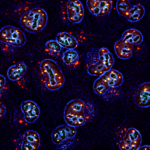Lien vers Pubmed [PMID] – 9834237
Blood 1998 Dec;92(11):4308-16
Acute promyelocytic leukemia (APL) is characterized by a specific t(15;17) chromosomal translocation that fuses the genes encoding the promyelocytic leukemia protein (PML) and the retinoic acid receptor (RAR). The resulting PML-RAR protein induces a block in the differentiation of the myeloid progenitor cells, which can be released by retinoic acid (RA) in vitro and in vivo. The RA-induced differentiation of APL blasts is paralleled by the degradation of the fusion protein and the relocation of wild-type PML from aberrant nuclear structures to its normal localization in nuclear bodies. Recently, arsenic trioxide (As2O3) treatment was proposed as an alternative therapy in APL, because it can induce complete remission in both RA-sensitive and -resistant APL patients. Intriguingly, As2O3 was also shown to induce degradation of the PML-RAR chimera and to reorganize PML nuclear bodies. Here we show that trivalent antimonials also have striking effects on RA-sensitive and RA-resistant APL cells. Treatment of the APL-derived NB4 cells and the RA-resistant subclone NB4R4 with antimony trioxide or potassium antimonyl tartrat triggers the degradation of the fusion protein and the concomitant reorganization of the PML nuclear bodies. In addition, as reported for As2O3, the antimonials provoke apoptosis of NB4 and NB4R4 cells. The mechanism of antimony action is likely to be similar to that of As2O3, notably both substances induce the attachment of the ubiquitin-like SUMO-1 molecule to the PML moiety of PML-RAR. From these data, we propose that, in analogy to As2O3, antimonials might have a beneficial therapeutic effect on APL patients, perhaps with less toxicity than arsenic.

